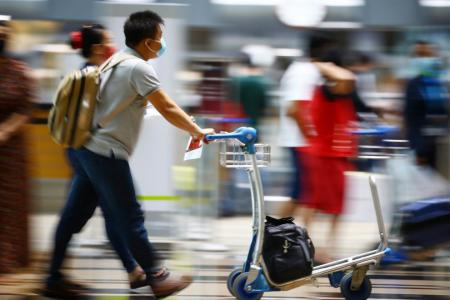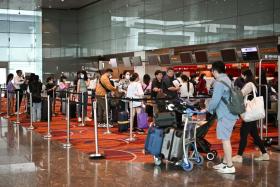Businesses cautiously optimistic of some tourists returning next year
While welcoming recent initiatives, many feel the virus situation is too fluid to expect a strong rebound soon
Singapore businesses and attractions that were once magnets for foreign tourists are cautiously optimistic that leisure travel will see a slight uptick next year.
But, while encouraged by government initiatives to ink deals on air travel with like-minded countries, many feel a significant rebound is still far off.
They are also wary of placing excessive hopes on the recent air travel bubble pact with Hong Kong.
Last Thursday, Transport Minister Ong Ye Kung announced the bilateral agreement, which allows people to travel between the two places with no restriction on travel purpose or the need to quarantine, subject to conditions, including testing negative for Covid-19.
Mr Ong called the move a small but significant step for the two aviation hubs, adding it was a model for more such partnerships to revive air travel.
Mr Steven Ler, president of the National Association of Travel Agents Singapore, said the pact has "breathed hope" for an uptick in leisure travel, which has pent-up demand.
"However, we envisage that overall international leisure travel will take longer to rebound because of the volatile pandemic situation, complexity of government regulations, mandatory quarantines and the high possibility of fast-changing policies," he added.
Mr Raphael Lim, head of marketing for Tall Ship Adventures, whose Royal Albatross in Sentosa offers luxury dining cruises, said tourist numbers will depend on the rest of the world.
He said: "(The agreement with Hong Kong) is good news and will definitely help, but this is not only about Singapore but other countries as well. The situation is unpredictable."
Citing the example of Malaysia's on-and-off lockdowns, he said the company has little expectation of a full return soon and is instead focusing on attracting locals with a new dinner menu.
Others cited the mindsets of tourists as one of the factors that will determine the industry's fate.
Said Mr Lawrence Koh, chief executive of indoor skydiving tunnel iFly Singapore, where 70 per cent of the clientele is made up of tourists: "We believe the rebound will happen gradually from the second half of next year.... Many will be observing how things go before resuming travel activities like before."
He felt the travel bubble will not have an immediate impact on tourism in the absence of visitors from countries such as China, Indonesia and India.
Mr Patrick Lee, sales and business development director at One Faber Group, which runs services, attractions and food and beverage outlets in and around Sentosa, said he is cautiously optimistic a rebound will happen soon.
VACCINE
But he added: "We are also aware that travellers will remain cautious when a vaccine is not ready and do not expect a full recovery until it is widely available sometime next year."
Mr Ong Hanjie, managing director of tour agency EU Asia Holidays, also felt people won't be comfortable travelling in big tour groups without a vaccine.
Some said the situation is too fluid to predict because it hinges on government policies, which can change in an instant.
Mr Luke Johnson, general manager of bungee jump attraction AJ Hackett Sentosa, said: "(The Hong Kong pact) is a good positive step, but it is something that requires governments to agree to the protocols for the travel bubbles for safe travel procedures.
"We hope tourism can return as soon as possible but the reality is there are still unknowns, such as the quota and conditions imposed on travellers."
The pace of recovery of air travel would depend on the considerations in place, tourism and health experts said.
Mr Chew Kian Beng, course chair for diploma in hospitality and tourism management at Temasek Polytechnic's School of Business, said that as the colder months approach, travellers could show symptoms of Covid-19 similar to the flu.
He said: "Realistically, countries with low and controlled community cases would likely reopen their borders only early next year to avoid the risk of imported cases."
Infectious diseases expert Asok Kurup said resuming air travel needs to be done cautiously as it depends on other countries getting Covid-19 under control.
He added: "As long as we don't have a vaccine, there has to be a careful and calibrated approach with water-tight policies because imported cases will be our weak link."
Get The New Paper on your phone with the free TNP app. Download from the Apple App Store or Google Play Store now



